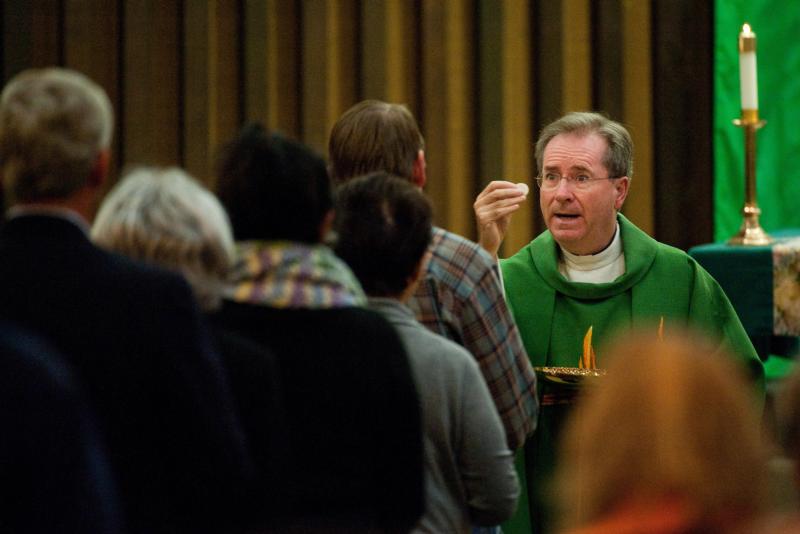
A priest distributes Communion during Mass at a California church. Through the Eucharist, we renew our baptismal and confirmation commitments to enter in and become the very body of Christ. (CNS photo/Don Feria)
If the liturgy is truly the source and summit of the life of the church, the Communion rite is the source and summit of the liturgy. Several prayers and acts earlier in the Mass may give us insight into this fuller union we are called to celebrate:
— As Mass begins, the celebrant invites us into the communion of the Trinity.
— Before the Gospel is read, we sign ourselves praying that these words would be on our minds, on our lips and in our hearts.
(See a related video.)
— In the creed, we state our belief in the communion of saints.
— During the offertory, our offering is symbolic of the very gift of our daily lives.
— As the priest or deacon mingles water and wine, he prays: “By the mystery of this water and wine, may we come to share in the divinity of Christ who humbled himself to share in our humanity.”
— In a prayer to the Holy Spirit, the priest asks the Spirit to come upon the offerings of bread and wine (and our lives) so that they (and we) may become the body and blood of Our Lord, Jesus Christ.
[hotblock]
— We respond “Amen” to the fact that “through him, and with him, and in him … in the unity of the Holy Spirit,” we are able to give “all glory and honor” to the Father.
— The priest reminds us that we are about to receive the Lamb of God, who takes away our sins and the sins if the world.
When the priest breaks the bread, we should recall how Jesus broke the bread at the Last Supper. We are about to join in this sacred meal and sacrifice of the cross. The priest commingles a piece of the consecrated host and prays as he puts it into the chalice: “May this mingling of the body and blood of Our Lord Jesus Christ bring eternal life to us who receive it.” He (and we) should be praying that we might become more what we are about to receive.
Now so close to receiving the Lord, we are asked to pray the adapted words of the Roman centurion in the Gospel (Mt 8:5-13 and Lk 7:1-10): “Lord, I am not worthy that you should enter under my roof, but only say the word and my soul shall be healed.”
How should we approach Communion as Catholics?
We joyfully and silently (when not singing) approach in procession. We seek healing, knowing that we are among those blessed to be called to the table. We reverently approach to acknowledge Jesus’ real presence. We are about to receive his very body, blood, soul and divinity.
Let’s not forget that this sacrament is also the third of the three rites of initiation: baptism, confirmation and Eucharist. It is through the Eucharist that we renew our baptismal and confirmation commitments to enter in and become the very body of Christ, i.e., to become more fully the church.
Why should Catholics embrace this time during the Mass as a community, rather than as individuals?
Reception of Communion is less about Jesus and me and more about how communion with Jesus makes us one, affirming our communion with the whole church. Our Communion song expresses with one voice our union with Jesus, one another and indeed with the whole church living and dead.
[tower]
This is one reason it is not appropriate to leave right after Communion, as so many sadly still do. To do so makes it appear that holy Communion is only about me and Jesus rather than the moment to become most a people gathered into communion with him.
We are mostly such a community at Communion time. We should then return to our seat and complete the full prayer of thanks together. We are encouraged to stay, give thanks and only leave after we have been blessed and sent.
Why is there a time of prayer that follows reception of Communion?
We pray quietly because we are now intimately united to him. We recall that we have entered into full communion with the saints (mentioned in the creed) and with all those whom we loved and who have preceded us in the pilgrimage to heaven. There is much for which to give thanks.
We thank God for this great food for our journey of faith — to strengthen us against sin, to help us to become more concerned for the poor, to become more of the body of Christ for the world we are about to enter as we leave Mass.
Silence leaves us in awe of the union with Our Lord and one another. We ought to pray to become more of the body of Christ for the world that we are meant to be so that we may spread the Gospel by our lives as we are sent to do as the Mass is ended. And perhaps, more grateful, we may be a little kinder when leaving the parking lot.
***
Dudley, retired from the U.S. Conference of Catholic Bishops Secretariat for Catholic Education, consults on curriculum development, leadership and ministry formation through his company, Ambulans Vobiscum. He holds a doctorate in ministry from Graduate Theological Foundation in Indiana and lives in New Castle, Pa.



Share this story